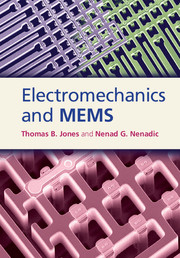Book contents
- Frontmatter
- Contents
- Preface
- 1 Introduction
- 2 Circuit-based modeling
- 3 Capacitive lumped parameter electromechanics
- 4 Small-signal capacitive electromechanical systems
- 5 Capacitive sensing and resonant drive circuits
- 6 Distributed 1-D and 2-D capacitive electromechanical structures
- 7 Practical MEMS devices
- 8 Electromechanics of piezoelectric elements
- 9 Electromechanics of magnetic MEMS devices
- Appendix A Review of quasistatic electromagnetics
- Appendix B Review of mechanical resonators
- Appendix C Micromachining
- Appendix D A brief review of solid mechanics
- Index
- References
Appendix B - Review of mechanical resonators
Published online by Cambridge University Press: 05 May 2013
- Frontmatter
- Contents
- Preface
- 1 Introduction
- 2 Circuit-based modeling
- 3 Capacitive lumped parameter electromechanics
- 4 Small-signal capacitive electromechanical systems
- 5 Capacitive sensing and resonant drive circuits
- 6 Distributed 1-D and 2-D capacitive electromechanical structures
- 7 Practical MEMS devices
- 8 Electromechanics of piezoelectric elements
- 9 Electromechanics of magnetic MEMS devices
- Appendix A Review of quasistatic electromagnetics
- Appendix B Review of mechanical resonators
- Appendix C Micromachining
- Appendix D A brief review of solid mechanics
- Index
- References
Summary
This appendix reviews the essentials of lumped parameter mechanical systems relevant to microelectromechanical sensors and actuators. Our focus here is mechanical resonators. This choice is based on the reality that, in the MEMS world, stictive phenomena such as van der Waals forces or capillarity are always lurking. Like a tree snagging a kite from the air, these forces can fasten upon a moving element and affix it permanently to an adjacent surface. For this reason, resonance is usually the best way to exploit large motions reliably in a MEMS device. We start with a simple spring-mass system with one degree of freedom and Newton's second law in scalar form. All the main concepts are derived from the single-degree-of-freedom linear model, and then generalized to multiple-degree-of-freedom models and continuous systems using modal analysis.
The approach taken in this appendix is tailored to students having some familiarity with Laplace transforms, from the perspective of either resonant electric circuits or mechanical resonators. The starting point is the differential equation of motion; simple Laplace techniques are introduced so that solutions to the equation can be obtained and the important properties of this solution can be studied.
Information
- Type
- Chapter
- Information
- Electromechanics and MEMS , pp. 473 - 497Publisher: Cambridge University PressPrint publication year: 2013
